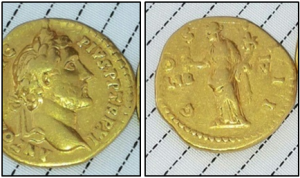Related Content
Press Release
Press Release
WASHINGTON – The U. S. Department of Justice announced today that the United States has filed a civil complaint seeking the forfeiture of multiple antiquities associated with the Islamic State of Iraq and the Levant (ISIL), also known as Da’esh. The complaint alleges that ISIL, which is designated by the U.S. Department of State as a Foreign Terrorist Organization, markets and sells antiquities to finance its terror operations.
The lawsuit marks the first time that the United States has filed an action to forfeit antiquities that are foreign assets of ISIL.
The action, which was filed in the U.S. District Court for the District of Columbia, specifically seeks the forfeiture of four archaeological items that were depicted in photographs found during a raid of a residence of Abu Sayyaf, a senior leader within ISIL, near Deir Ezzor, Syria, in May 2015. The items include a gold ring, two gold coins, and a carved stone. They date to ancient times and are believed to be worth hundreds of thousands of dollars. The FBI is pursuing recovery of these items.
The lawsuit was filed by the U.S. Attorney’s Office for the District of Columbia following an investigation into items seized in the raid. During the operation, Abu Sayyaf was killed when he engaged with U.S. military forces.
According to the civil complaint filed today, the United States recovered data from electronic media during the raid, including photographs of the four items at issue in the complaint. The complaint also makes public documents recovered from the raid that reveal significant information about the organizational structure of ISIL, and how ISIL created a sophisticated bureaucratic system for extracting wealth from sites containing materials that are important to the cultural heritage of the people of Syria and Iraq. For example, according to the lawsuit, excavation permits and receipts of collections written on ISIL letterhead (which are attached to the complaint) were passed among members of the Antiquities Department. Abu Sayyaf referred to himself in these documents as the President of the Ministry of Natural Resources Antiquities Department. There are also discussions of depositing the proceeds of ISIL’s antiquities trafficking into ISIL’s treasury.
According to analysis by antiquities experts, the documentary style, lighting, and focus of the photographs indicate that the photographed antiquities were prepared for marketing in order to sell the items internationally. The subsequent investigation has revealed that ISIL sold antiquities in U.S. dollars, including of at least one of the antiquities in the complaint.
Under United States law, all assets, foreign or domestic, of a terrorist or terrorist organization, and all assets, foreign or domestic, affording a source of influence over any such entity or organization, are subject to forfeiture.
**
“This complaint demonstrates the United States government’s intent to diligently pursue actions that will limit the ability of ISIL and other terrorist organizations to generate revenue,” said Channing D. Phillips, U.S. Attorney for the District of Columbia. “This complaint also serves as a warning to those who traffic in precious antiquities and who seek to profiteer from ISIL’s exploitation of the cultural heritage of areas under its control.”
“The documents unsealed today reveal that ISIL specifically directed its members to steal archaeological objects for purposes of selling them on the black market in order to use the proceeds to support this designated terrorist organization,” said Paul M. Abbate, Assistant Director in Charge of the FBI’s Washington Field Office. “ISIL members extorted and threatened to arrest anyone outside of the terrorist organization who attempted to excavate, sell or transport antiquities from the territory under their control. It is essential for the FBI to recover these items so that we can stop the illegal flow of funds to support terrorist activity and repatriate these historical treasures.”
**
Specifically, the complaint alleges that the following items are subject to forfeiture:

1) Gold ring with carved gemstone |

2) Gold coin featuring Antoninus Pius |

3) Gold coin featuring Emperor Hadrian Augustus Caesar |

4) Carved Neo-Assyrian Stone |
Because civil forfeitures are suits against the property itself, the complaint names the four above antiquities as the defendants. The claims made in the complaint are only allegations and do not constitute a determination of liability.
This case is being investigated by the FBI’s Washington Field Office, with support from the U.S. Department of State. Assistant U.S. Attorneys Arvind K. Lal, Zia M. Faruqui, Deborah Curtis, Brian P. Hudak, Christopher B. Brown, and Ari Redbord, with the assistance of Paralegal Specialist Toni Donato, all from the U.S. Attorney’s Office for the District of Columbia, are representing the government.
The FBI reminds the public to come forward with any information they may have about stolen art or cultural heritage items. Tips can be submitted to tips.fbi.gov. Tipsters may remain anonymous.
Art and cultural item buyers are recommended to review the FBI’s National Stolen Art File prior to a purchase to avoid civil forfeiture of stolen items.
In addition, the U.S. Department of State's Rewards for Justice program is offering rewards for information that will disrupt the trade of trafficking of antiquities that benefit ISIL. The Secretary of State has authorized a reward of up to $5 million for information leading to the significant disruption of the sale and/or trade of antiquities by, for, on behalf of, or to benefit ISIL.